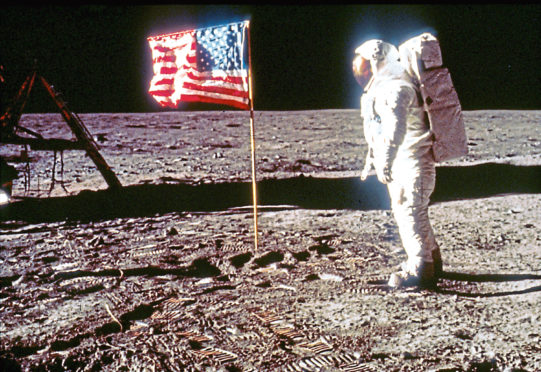
People across the UK are being urged to share their memories and photographs of the Apollo 11 moon landing ahead of the historic event’s 50th anniversary in July.
The public are being asked to submit their personal accounts of the occasion, which saw Neil Armstrong and Buzz Aldrin become the first astronauts to walk on the moon on July 21 1969.
Memories are being collected by the Arts and Humanities Research Council (AHRC) and the UK Space Agency, who will curate and share a selection on July 20, the day Mr Armstrong and Mr Aldrin landed on the moon.
“The 1969 Apollo 11 moon landing was not just a pivotal moment in space exploration, but a defining moment for humanity,” British astronaut Tim Peake said.
“Whether you were too young to witness the first footsteps on the moon, or old enough to see it for yourself, the moon landing has inspired so many people over the past 50 years.”
People are welcome to upload anything from written accounts and stories of how the moment inspired them, to grainy photographs of families gathered around the television and newspaper cuttings.
“Landing on the moon was unthinkable at the beginning of the 20th century, so when Neil Armstrong heralded the moment as, ‘one giant leap for mankind’, those words rightly have echoed through the ages,” science minister Chris Skidmore said.
“Through our modern Industrial Strategy, we are backing the UK’s thriving space sector so that the young people inspired by this great event of the past will have opportunities to work in the industry’s highly skilled, well-paid jobs of the future.”
American space agency Nasa recently launched a similar initiative of its own, asking people to send voice recordings of their memories for an audio series about Apollo 11.
“As a young child I was, like millions of people around the world, fascinated watching the Apollo 11 moon landing,” Sue Horne, head of space exploration at the UK Space Agency, said.
“I remember our headmistress, who disapproved of television, insisted that the school television was on at lunchtime so we could watch the latest news on this historic event.
“The moon landing was an inspiration to me and it’s exciting to think that young people today will be part of the next chapter of lunar exploration, with the UK playing an important role.
“I am looking forward to sharing in people’s memories of this iconic moment in space exploration and hearing how those small steps are still having a huge impact 50 years on.”
People have until June 18 to submit their memories on moonlandingmemories.com.

Enjoy the convenience of having The Sunday Post delivered as a digital ePaper straight to your smartphone, tablet or computer.
Subscribe for only £5.49 a month and enjoy all the benefits of the printed paper as a digital replica.
Subscribe